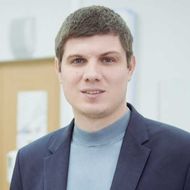XIV International Conference on Higher Education Took Place at HSE University
This year’s conference topic was ‘Student Experience at a Modern University: from an Enrollee to a Graduate’. Over the three days, researchers from Russia and other countries discussed the individual and institutional factors that determine students' educational experience, the impact of this experience on educational performance, and its influence on labour market success. The conference took place from October 25–27 and featured over 90 presentations.
In her opening speech, Vice Rector Elena Odoevskaya explained why student experience was chosen as the key topic of this year’s event.

Elena Odoevskaya
‘Students are the main reason why a university erects walls, creates programmes, and establishes partnerships with industries. They are the ones who will develop our country and others—among the conference participants are representatives from China, the UAE, Sri Lanka, and other countries. Therefore, it is crucial to understand the student experience within a university, their interactions with key stakeholders, and their decision-making process when selecting a university and future career path.’
Evgeniy Terentev, Director of the HSE Institute of Education, described the conference as a friends’ reunion. Fourteen years ago, when the conference was first founded, it was a small-scale affair that none would have predicted would eventually span three days and receive 200 applications.

Evgeniy Terentev
‘One of the primary objectives of the conference over the years has been to foster a research-oriented atmosphere for addressing higher education issues. While there are numerous platforms available for discussing political aspects of higher education development, there is a dearth of opportunities for discussions of evidence-based research. I propose that we take it as a rule to conduct evidence-driven conversations and substantiate our statements and findings with relevant data during the course of these three days.’
Consortia
The first roundtable, which took place on October 25, was dedicated to scientific and educational consortia formed by universities and businesses, and the evaluation of the effectiveness of their interactions.
Elena Odoevskaya moderated the event. She talked about different approaches to the concept of a consortium. For example, in the Priority 2030 programme, it is described as ‘a temporary voluntary association of universities with other organisations to coordinate activities and consolidate resources when implementing breakthrough projects that ensure the scientific and technological development of the country.’

Tatiana Zhdanova, Deputy Director at Sociocentre, told the audience that the Priority 2030 programme involves 132 universities, which have created 390 consortia with over 3,000 partners. These consortia are aimed at solving complex issues for the benefit of regions, industries, and societies, while universities get involved in these activities and attract young people to them.
Anna Stepanova, Deputy Vice President for Educational Projects at VK, spoke about cooperation with universities from the perspective of businesses: for them, the important aspects are the social part of the ESG agenda, interaction with the consumers of their products, and headhunting students. However, she believes that there is still a lack of good practices and partnerships based on mutual interest and benefit, rather than being a burden to businesses or universities.
HSE Vice Rector Irina Martusevich spoke about HSE University’s experience of employer relations and facilitating access to businesses’ young target audiences.

Irina Martusevich
HSE Vice Rector Irina Martusevich spoke about HSE University’s experience of employer relations and facilitating access to businesses’ young target audiences. ‘We give students and businesses an opportunity to shorten the initial introduction period thanks to deep integration in our projects and extracurricular activities,’ she said. Over 65% of HSE students gain working experience during their studies, which helps them make better-informed employment decisions upon graduation.
Altynai Adzhikova, Vice Rector at MTUCI, spoke about her university’s experience of industry relations, while Roman Laas, Director of the Educational Product Centre at Tomsk Polytechnic University, told the audience about ‘Big Tomsk University’, a consortium of universities and academic institutes located in Tomsk and centred around ‘on par’ interaction. The roundtable discussion finished with a discussion of the impact of consortia on student experience.
Campuses
The next conference event was a panel discussion on ‘The Possibility and Reality of University Campus Projects.’ Evgeny Terentev, who moderated the discussion, said that it follows on from the roundtable on consortia, since various institutions take part in the evolution of new campuses. In Russia, several projects are currently underway in which a single campus is created by the city for several higher education institutions. ‘The idea behind a campus is to create a comfortable environment for achieving high educational and research performance, and this requires new solutions and business models,’ he added.
Taisiya Pogodayeva, Director of BIM Campus, a company that implements the Big Ivanovo Manufacture (BIM) project as part of a concession agreement, said that the topic of campuses is much more complex, since in consortia ‘there’s no need to share properties.’ She believes that the creation of a campus gives universities a ‘chance to reinvent themselves,’ while for cities, it is a tool of spatial development.

Conference participants from various regions of Russia spoke about creating campuses in their respective cities: Sergey Kotsukon, Deputy Minister of Digital and Technological Development of Sakhalin Oblast; Alexandra Lebedeva, Deputy Prime Minister of Kamchatka Krai; Vitaly Litke, Deputy Minister of Education and Science of Chelyabinsk Oblast; Yury Marfing, Acting Rector of Pacific University in Khabarovsk.
In Sakhalin, creating a campus is not seen as at a profit-making project. ‘For us, it is an opportunity to develop the region’s infrastructure and to modernise our university,’ explained the region’s representative.
For Petropavlovsk-Kamchatsky and Ivanovo, campuses are one of the key objects in the cities’ master plans, given their central location.
Before the campus project, universities in Chelyabinsk had not interacted with each other or with regional authorities. The project is also joined by industry partners who offer venue rental, collaboration ideas, and more.

Magdalena Gaete
Magdalena Gaete, Senior Research Fellow at the Laboratory for Reputation Management in Education at HSE University-St Petersburg, spoke about global trends in campus development. There have been no cases in Europe or the USA when a decision was made to first create one campus for several universities, and only after that did the universities start cooperating. ‘A unique experiment is underway in Russia, and we will follow its progress,’ Evgeny Terentev concluded.
See also:
HSE University and National Academy of Sciences of Kazakhstan Agree on Cooperation
In early February, HSE University's campus on Pokrovsky Bulvar hosted a meeting between HSE Vice Rector Victoria Panova and Abay Serikkanov, Vice President of the National Academy of Sciences of the Republic of Kazakhstan. The parties explored potential areas of cooperation and concluded the meeting by signing a memorandum of intent.
HSE University among Top Universities in Digital Economy
HSE University took second place in the new 2023 ranking of universities in the digital economy in Moscow and St Petersburg, having lost only to Bauman Moscow State Technical University. HSE University outperformed specialised IT universities such as Moscow Institute of Physics and Technology (third place) and ITMO University (fifth place), as well as Moscow State University (fourth place).
‘Our Beloved University Continues to Stride Forward with Unwavering Confidence’
HSE Rector Nikita Anisimov has congratulated university students, teachers, and staff on the upcoming New Year. ‘May each and every one of you spend these festive days in a heartwarming atmosphere, rejuvenating and reuniting with your families. I hope that the upcoming 2024 is filled with positive events in your lives, studies, and careers,’ he said.
‘University Life in Partnership with Artificial Intelligence’
HSE University is one of the leaders in IT education and research in the field of artificial intelligence (AI). Thanks to this, the university recently received the highest grant of the Priority 2030 programme. The integration of AI technologies into education is set to become a strategic direction for the university’s development over the next five years. What changes are coming to HSE University in this regard and how they will affect students and teachers? These issues were discussed at a meeting of HSE University’s Academic Council on December 20.
'While it May Sound Futuristic, It Holds Great Promise': Olga Dragoy Shares Her Thoughts on Language Function Restoration and the Future of Neurotechnology
In the spring of 2023, the fifth strategic project of the Priority 2030 programme, 'Human Brain Resilience: Neurocognitive Technologies for Adaptation, Learning, Development and Rehabilitation in a Changing Environment,' was launched at HSE University. The strategic project brings together researchers from all campuses of HSE University. In her interview with the HSE News Service, Olga Dragoy, head of the strategic project and Director of the HSE Centre for Language and Brain, shares an overview of the advanced technologies neuroscientists are creating today, the underlying inspiration driving these efforts, and the operational dynamics of interdisciplinary applied projects.
HSE University Receives Highest Grant under Priority 2030 Programme
HSE University has proved its leading position in the first group of the ‘Research Leadership’ field under the Priority 2030 programme. The university has also received the highest grant for teaching digital competencies to students, demonstrating its educational leadership in the fields of digital technologies and AI.
HSE Launches English-Language Strategic Development Website
The new website makes information on the university’s strategic development initiatives and opportunities available to international colleagues and partners. The Strategic Development Programme Office has launched anEnglish-language website to promote the implementation of HSE University’s integrated development programme. The website is an ‘entry point’ for international partners and students, informing them about the university’s strategic priorities, goals, and plans.
‘It Was Great to Look at Scientific Achievements through the Eyes of a Journalist, not a Scientist’
HSE University in Nizhny recently hosted the 2nd Autumn Neuro-linguistic School ‘NeuroSciCom: Popularising Language and Brain Studies’ for scientists and students at the HSE Centre for Language and Brain Studies in Nizhny Novgorod. The school was held as part of the 'Human Brain Resilience: Neurocognitive Technologies for Adaptation, Learning, Development and Rehabilitation in a Changing Environment' Strategic Project of the Priority 2030 programme.
HSE in India: ‘Cooperation Is Formed by the Development of Live Communication Between People’
HSE University is taking part in the Annual International Conference and Global Summit (AICGS-2023), which began in Phagwara, India, on October 30. This year’s topic of discussion was the new model of international cooperation in the field of sustainable development, as well as the prospects and global challenges faced by universities in the development of international ties today.
Shanghai Ranking Names HSE Top Russian University in 11 Subjects
HSE University is this year’s leading Russian university in 11 subjects in the Shanghai Ranking. In seven of these, the university is the only Russian higher education institution to appear. This year, the university was ranked among the top universities for Communications for the first time and returned to the ranking for Sociology.


